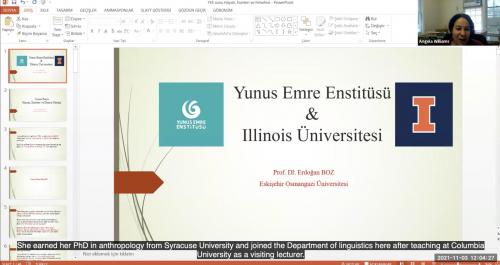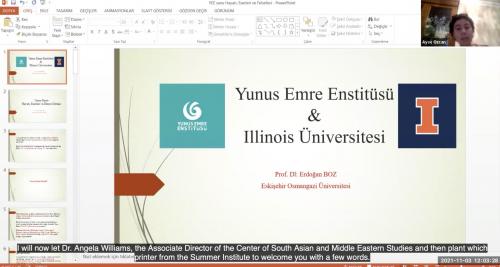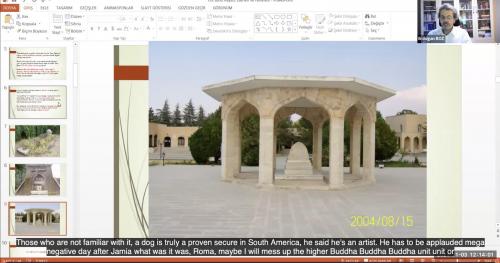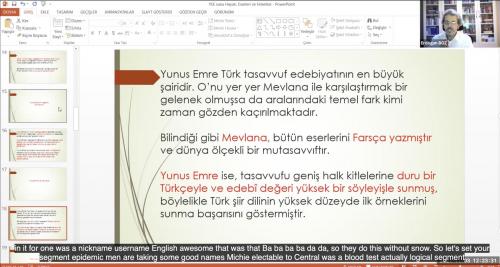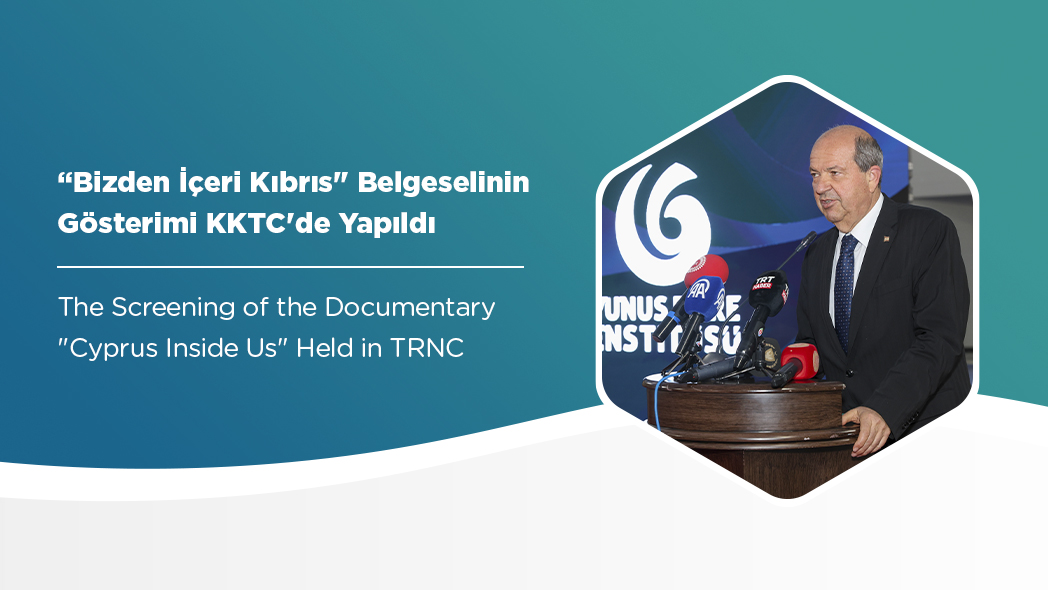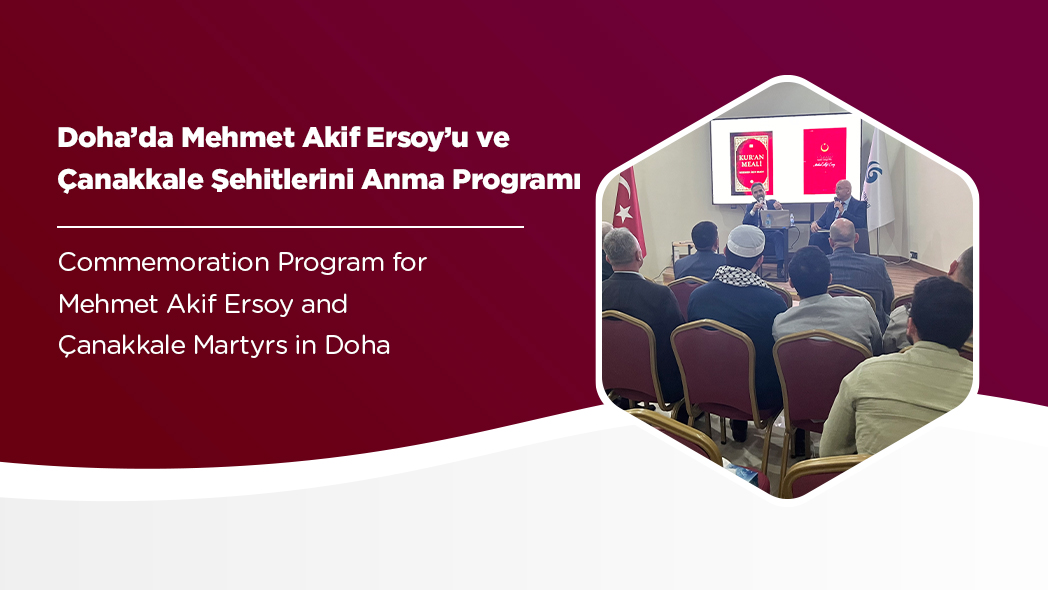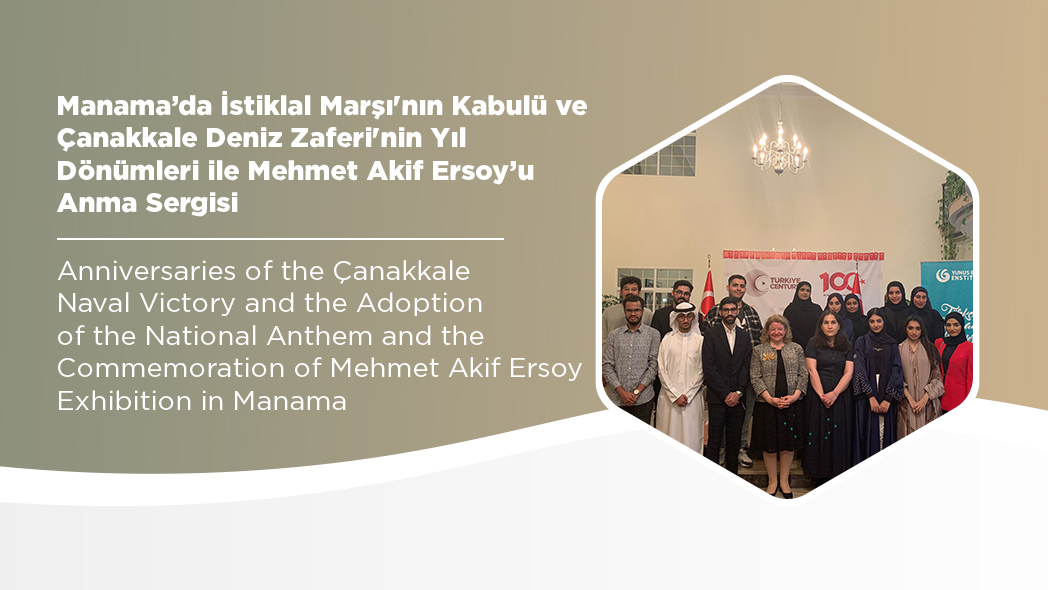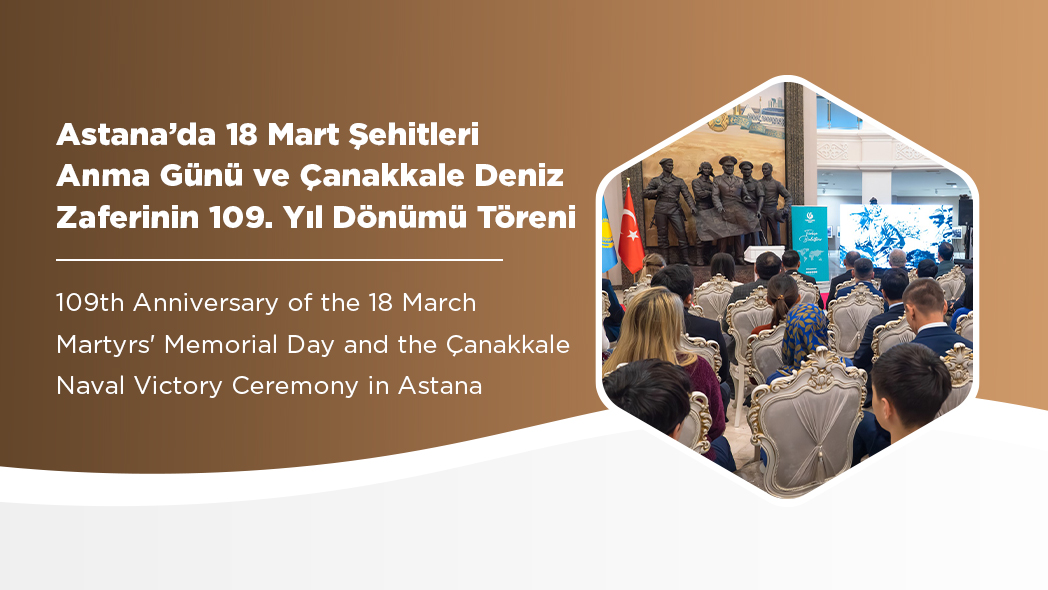Yunus Emre: His Life, Works and Philosophy
At the fifth event organized by Yunus Emre Institute within the scope of the cultural collaboration with the University of Illinois, the life and philosophy of Yunus Emre, one of the most important personalities of the Turkish language and culture and who had an important influence in Anatolia's understanding of Sufism, was discussed. Prof. Erdoğan Boz, Member of the Faculty of Turkish Language and Literature of Eskişehir Osmangazi University, was the guest speaker of the program organized on November 3, 2021.
The program was organized on the occasion that the Presidency of the Republic of Turkey declared 2021 as the Year of Yunus Emre and Turkish Language and UNESCO included 2021 in the List of Anniversaries and Commemorations as it was the 700th anniversary of Yunus Emre's death and Prof. Boz delivered a presentation themed "Yunus Emre: His Life, Works and Philosophy".
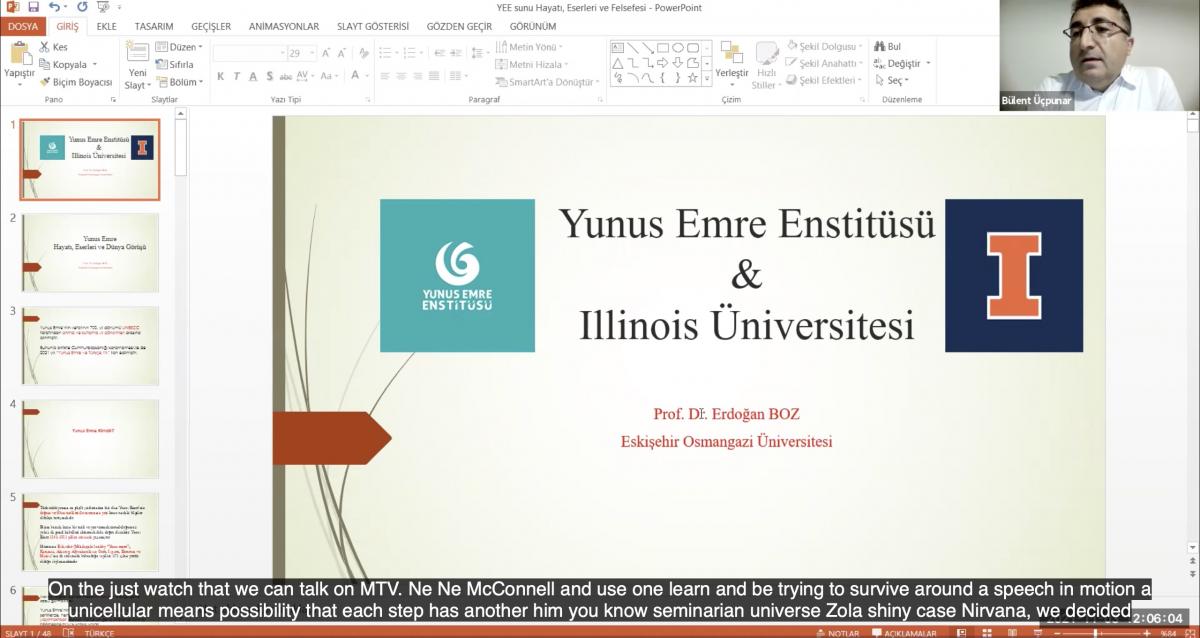 Toronto Yunus Emre Institute Director Bülent Üçpunar delivered the opening speech of the program. At the program that was moderated by Ayşe Özcan, the Director of Turkish Language Program under the Department of Languages at the University of Illinois Urbana Champaign, Üçpunar first mentioned that the programs organized under the collaboration of the University of Illinois and Yunus Emre Institute have been continuing successfully and wished that this events continued. Üçpunar said that Prof. Erdoğan Boz prepared three works for publication since this year was the Year of Yunus Emre and Turkish Language and that these works were "Yunus Emre Anthology", and Yunus Emre's works titled "Dîvan" and "Risaletü'n-Nushiyye".
Toronto Yunus Emre Institute Director Bülent Üçpunar delivered the opening speech of the program. At the program that was moderated by Ayşe Özcan, the Director of Turkish Language Program under the Department of Languages at the University of Illinois Urbana Champaign, Üçpunar first mentioned that the programs organized under the collaboration of the University of Illinois and Yunus Emre Institute have been continuing successfully and wished that this events continued. Üçpunar said that Prof. Erdoğan Boz prepared three works for publication since this year was the Year of Yunus Emre and Turkish Language and that these works were "Yunus Emre Anthology", and Yunus Emre's works titled "Dîvan" and "Risaletü'n-Nushiyye".
YUNUS HAS TOMBS IN OVER 15 CITIES
Prof. Erdoğan Boz mentioned that Yunus Emre Institute organized this event on the occasion that the Presidency of the Republic of Turkey declared 2021 as the Year of Yunus Emre and Turkish Language as it was the 700th anniversary of Yunus Emre's death.
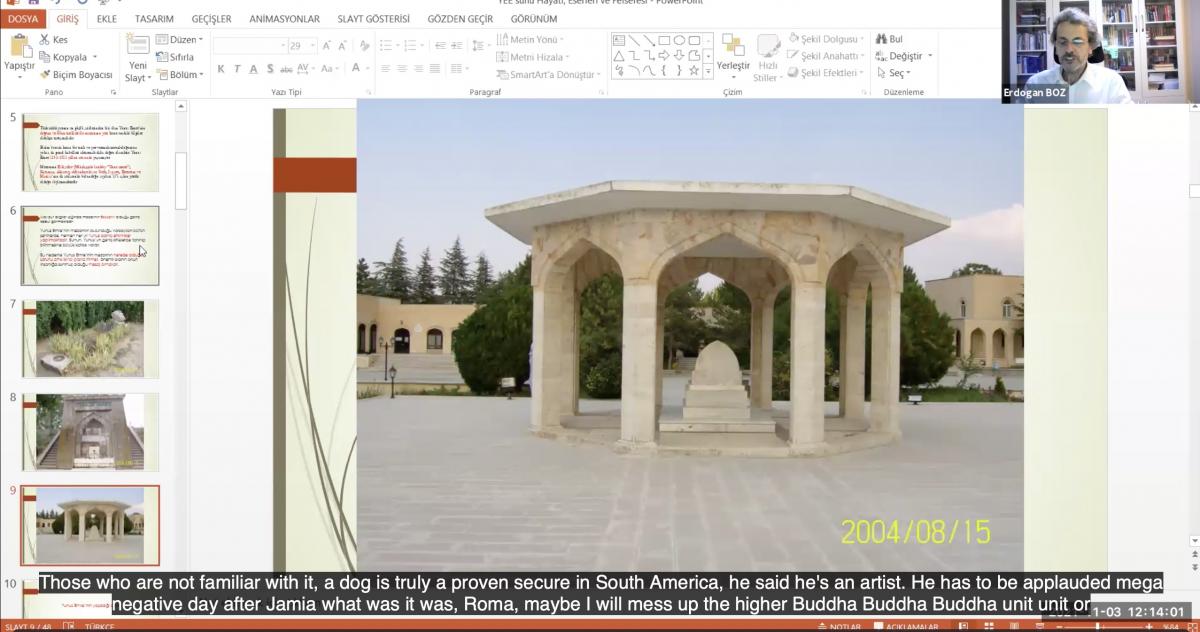
Prof. Boz mentioned that even though Yunus Emre was one of the most prominent poets of the Turkish language, his dates of birth and death and the location of his burial was unknown. Prof. Boz stated that Yunus Emre lived between 1241-1321 according to the scholarly consensus and mentioned that there were rumors that the burial of the famous Turkish Sufi was in approximately 15 cities of Turkey such as Eskişehir, Karaman, Aksaray, Afyonkarahisar, Ordu, Isparta, Erzurum and Manisa. Boz mentioned that some of such burials belonged to some other persons who are also named Yunus or some of the burials were not graves but maqams. Prof. Boz argued that Eskişehir was the highest possible location among these burial sites and mentioned that Eskişehir was accepted as the burial grounds of Yunus Emre by the Presidency of the Republic of Turkey. However, he also explained that the rumors of different burial locations caused Yunus Emre to be adopted and known further.
HE HAD BECOME HOPE FOR THE PEOPLE IN A DIFFICULT TIME IN ANATOLIA
Prof. Boz emphasized that a simple language and narrative of deeper philosophy, in other words, "sehl-i mümteni", was more prominent in Yunus Emre's poems. He highlighted that the most important element of Yunus Emre's poems was the messages that Yunus wanted to relay. Prof. Boz mentioned that Yunus Emre's body was exhumed from his original resting place in 1949 and transferred to a mausoleum with a ceremony attended by 10,000 people and said that a large külliye was created after the mausoleum and Yunus Emre had been resting in this mausoleum since May 24, 1970.
 Yunus Emre lived in the second half of the 13th century and the beginning of the 14th century, or in other words, the most trying times of Anatolian geography. Important events such as the dissolution of the Sultane of Rum, the emergence of the Anatolian Beyliks, the Mongol conquests, rebellions and the foundation of the Ottoman State have occurred in this period. Prof. Boz emphasized that Yunus Emre lived in a period filled with rebellions and external interventions and stated that such a difficult period was influential in the emergence of a philosopher such as Yunus Emre. Boz said that the people, consumed with wars and upheavals, needed a strong will and belief that would lead to their salvation and stated that the people could finally find such hope with the foundation of the Ottoman State in 1299 and the emergence of exalted personalities such as Mevlâna Hacı Bektaşî Veli and Yunus Emre.
Yunus Emre lived in the second half of the 13th century and the beginning of the 14th century, or in other words, the most trying times of Anatolian geography. Important events such as the dissolution of the Sultane of Rum, the emergence of the Anatolian Beyliks, the Mongol conquests, rebellions and the foundation of the Ottoman State have occurred in this period. Prof. Boz emphasized that Yunus Emre lived in a period filled with rebellions and external interventions and stated that such a difficult period was influential in the emergence of a philosopher such as Yunus Emre. Boz said that the people, consumed with wars and upheavals, needed a strong will and belief that would lead to their salvation and stated that the people could finally find such hope with the foundation of the Ottoman State in 1299 and the emergence of exalted personalities such as Mevlâna Hacı Bektaşî Veli and Yunus Emre.
HACI BEKTAŞI VELI DIRECTED YUNUS EMRE TO TAPTUK EMRE
Prof. Boz stated that some sources describe Yunus Emre as an illiterate, vagabond life but this was completely wrong. Prof. Boz highlighted that everyone who reads the work entitled Risaletü'n-Nushiyye could see the traces of a high culture and emphasized that there was no doubt that Yunus Emre was a person of culture who knew religious disciplines, positive sciences, philosophy, world history, sociology and the languages of Arabic and Persian.
Prof. Boz mentioned Yunus Emre's journey in becoming a Sufi and said, "The historical even of directing Yunus Emre from Hacı Bektaşî Veli to Taptuk Emre is a beginning for Yunus Emre. And that beginning, has provided a historical personality such as Yunus Emre."
Prof. Boz explained that Yunus Emre was under Taptuk Emre, whose burial is located in Emrem Sultan Village of Ankara, and that he spent his period of purification and maturing at the Taptuk Emre dergâh (dervish convent).
"HE HAS ALWAYS BEEN A PEOPLE'S PERSON"
After his period of maturing, Yunus Emre read poems of wisdom and addressed the people through their common language. Prof. Boz stated that Yunus Emre was trained in many religious disciplines, sciences and foreign languages but he always acted as one of ordinary people and was enshrined in the heart of people.
Prof. Boz mentioned that Yunus Emre was the greatest poet of the Sufi literature and said "Although it has become a tradition to confuse Yunus Emre with Rumi sometimes, the fundamental difference between the two is generally overlooked. As is known, Rumi wrote all his works in Persian and is a Sufi in the global scale. Yunus Emre, on the other hand, relayed the Sufism to large common audiences in plain Turkish."
Prof. Boz, who compiled the works of Yunus Emre entitled Risâletü’n Nushiyye and the Yunus Emre Anthology, explained that these works were published by Yunus Emre Institute. Prof. Boz also gave the good news that Yunus Emre's work entitled Dîvan, which is prepared for publication by himself, will also be published soon.
THE WORKS OF YUNUS INVITE THE WHOLE WORLD TO GOOD ETHICS
Prof. Boz mentioned that Rishâletü’n Nushiyye mentioned about "the Book of Counsel" and stated that this work was a small mesnevi comprised of 562 verses which delivers human values through an Islamic perspective. Prof. Boz said that the concepts such as mind, faith, anger, stinginess as per the social life of the period were delivered from within the scene of war in the work.
Prof. Boz mentioned that Rishâletü’n Nushiyye provided good habits and behaviors against bad habits and behaviors and said the following about the chapters in the book: "Self (greed) and spirit (richness of heart)", "self-complacency and humbleness", "anger and patience", "jealousy/stinginess and generosity", and "gossip/slander and rightness."
Yunus Emre's poems entitled Dîvan are comprised of poems that are orally transmitted by the Turkish people for centuries in the form of hymns. There are more than 40 copies of Dîvan in the libraries, and the number of poems change in Dîvan depending on different manuscripts.
Prof. Boz mentioned the philosophy of Yunus Emre and explained that subjects such as interpersonal relationships, visiting the sick ones and tending to their needs were very important for Yunus Emre and that Yunus Emre included all the goodness caried out by every person would be reciprocated in the afterlife. Prof. Boz mentioned that Yunus Emre was against laziness and waiting for others to do your work and said, "He has the view that 'a person only achieves what he works for'. Therefore, he emphasizes not apathy but hardworking. The concept of apathy found in the poems of Yunus do not symbolize laziness but the helplessness before the blessings of Allah."
Prof. Boz provided examples from the verses in the works of Yunus Emre and explained that Yunus talked about important issues such as generosity and helping other humans, speaking when necessary, to act with mindfulness to be happy, to not discriminate between people who are looked upon by the God through his sacred light.
Prof. Boz answered the questions of the participants at the end of the program.


